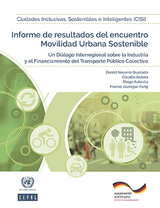
Informe de resultados del encuentro Movilidad Urbana Sostenible: un diálogo interregional sobre la industria y el financiamiento del transporte público colectivo
Navarro Quesada, Daniel / Claudia Acosta / Diego Aulestia / Franco Jauregui-FungExternal Publications (2022)
Santiago de Chile: Comisión Económica para América Latina y el Caribe (CEPAL)
En este documento se presentan los resultados del intercambio realizado entre la Comisión Económica para América Latina y el Caribe (CEPAL) y el German Institute of Development and Sustainability (IDOS), como parte del proyecto “Ciudades inclusivas, sostenibles e inteligentes en el marco de la Agenda 2030 para el Desarrollo Sostenible en América Latina y el Caribe”. El evento se realizó los días 24 y 25 de mayo de 2022 y tuvo por objeto explorar distintas iniciativas de política pública en torno a la implementación del gran impulso para la sostenibilidad en la movilidad urbana. La reflexión estuvo inspirada en dos grandes preguntas: ¿Cuáles son las condiciones y posibilidades de la industria para responder a las exigencias de la movilidad urbana sostenible? y ¿cuáles son los problemas, requerimientos y oportunidades del financiamiento del transporte público sostenible en las ciudades? Para ello, se analizaron los casos de China y la India, junto con la situación actual y las perspectivas de América Latina en torno a los beneficios de implementar el gran impulso para la sostenibilidad como una estrategia orientada a alcanzar un nuevo modelo de desarrollo sostenible impulsado por las demandas urbanas de servicios públicos.
This document presents the results of the exchange carried out between the Human Settlements Unit of the Sustainable Development and Human Settlements Division of the Economic Commission for Latin America and the Caribbean (ECLAC) and the German Institute of Development and Sustainability (IDOS) within the framework of the “Inclusive and sustainable smart cities in the framework of the 2030 Agenda for Sustainable Development” project. The exchange aimed to explore different public policy initiatives around the implementation of the Big Push for Sustainability within the field of urban mobility. The reflection was inspired by two big questions: What are the conditions and possibilities of the industry to respond to the demands of sustainable urban mobility? And what are the problems, requirements and opportunities for financing sustainable public transport in cities? To do this, the cases of China and India were analysed, along with the current situation and perspectives of Latin America regarding the benefits of implementing the Big Push for Sustainability as a strategy aimed at achieving a new model of sustainable development driven by urban demands for public services.

